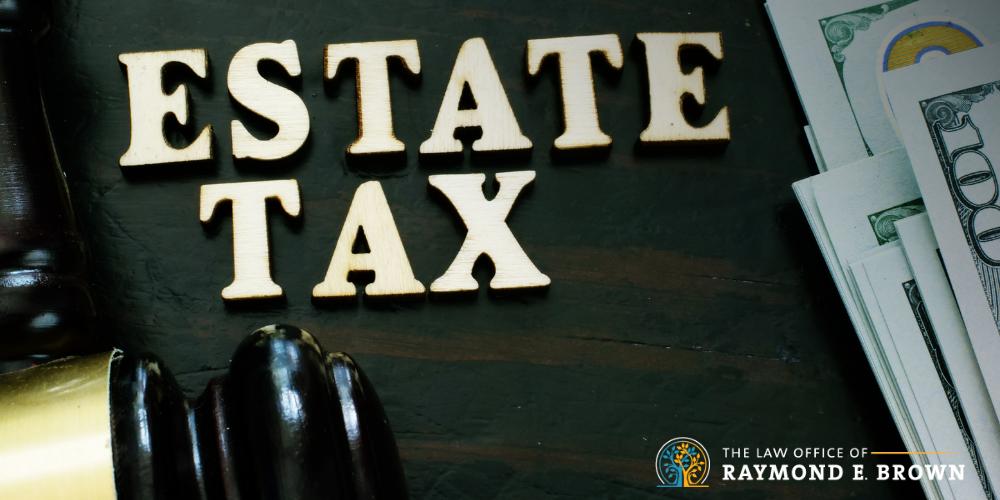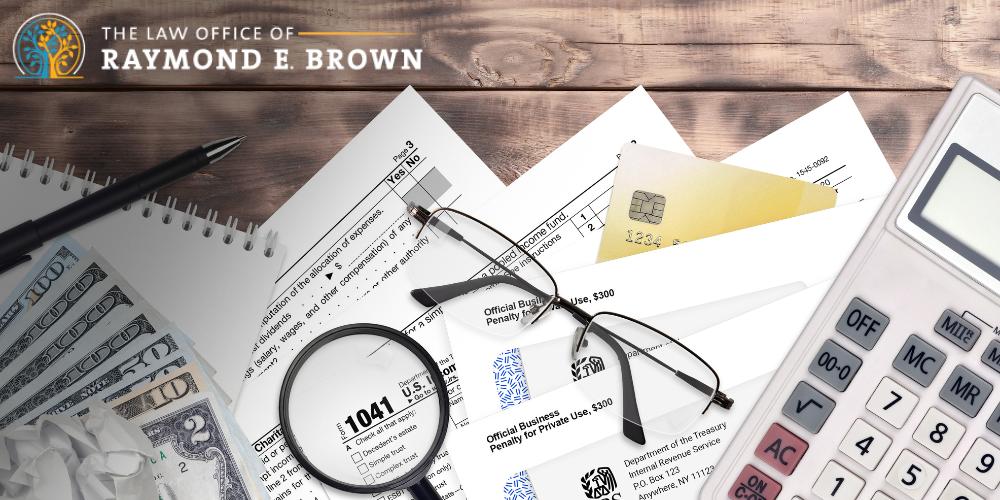Estate Tax Planning
Home > Practice Areas > Estate Tax Planning
Annapolis, Maryland Estate Tax Planning
Experienced Estate Tax Planning Attorney Serving Anne Arundel County, Washington D.C., and Beyond
Estate tax planning is an important part of a comprehensive estate planning strategy for residents of Maryland, a state known for its rich history and diverse wealth profiles. At The Law Offices of Raymond E. Brown, we understand that the preservation of your hard-earned assets and the seamless transfer of wealth to your beneficiaries is a matter of utmost importance for you and your family. With the ever-changing estate tax considerations both federally and state-wide, it’s imperative that equip yourself with the knowledge and guidance of an experienced estate planning attorney like Raymond E. Brown.
Estate tax planning is not a one-size-fits-all endeavor. That’s why Raymond E. Brown and his legal team are proud to work with Maryland residents in creating tailored strategies that align with their individual goals and financial landscape. Whether you’re looking to protect your wealth from the uncertainties of the future or to ensure that your loved ones receive the full benefits of your life’s work, the Annapolis estate planning attorneys at The Law Office of Raymond E. Brown are your trusted allies in crafting an estate tax plan that’s right for you.
To learn more about how to protect your individual estate from federal and state taxes, call our law firm at (443) 554-9944 or contact us online today to schedule a free consultation.

Federal Estate Taxes vs. Maryland Estate Taxes
Federal and Maryland estate taxes are two distinct layers of taxation that can affect an estate at the time of an individual’s passing. The federal estate tax is levied by the U.S. government and applies to the transfer of the decedent’s assets to their heirs and beneficiaries. It’s characterized by a significant exemption threshold, which means that estates valued below this threshold are not subject to federal estate taxes. However, for estates that exceed this limit, the tax rate can be substantial, making it a critical consideration for high-net-worth individuals.
On the other hand, Maryland imposes its own estate tax separate from the federal tax. While it also offers an exemption, Maryland’s threshold is typically lower than the federal exemption, meaning that estates may be liable for Maryland estate tax even if they are exempt from federal tax.
It’s essential that individuals, particularly those with a complex estate, consider both federal and Maryland estate taxes to ensure a comprehensive strategy. Failure to account for either or both can lead to unexpected tax liabilities and seriously diminish the value of the estate passed on to future generations. Strategic planning with knowledgeable estate planning lawyers like those at The Law Office of Raymond E. Brown can help mitigate these taxes, preserving more of your estate for your intended beneficiaries and ensuring that your legacy is honored according to your wishes.

Federal Estate Tax System
The federal estate tax system in the United States is a tax on the transfer of the estate of a deceased person. It applies to the entire taxable estate before distribution to any beneficiaries. The system is governed by a set of progressively increasing tax rates that apply to the value of an estate that exceeds a certain threshold, which is adjusted periodically for inflation.
2023 Federal Estate Tax Exemption Limits and Rates
In 2023, the federal estate tax exemption is set at $12,920,000 for individuals, meaning that estates with a total value below this amount are not subject to federal estate taxes. For married couples, the exemption is doubled ($25,840,000). The tax rate for amounts above this exemption is set at 40%.
How To Minimize Federal Estate Tax Liabilities
Minimizing federal estate tax liabilities is a key objective in estate planning, especially for individuals with assets that may exceed the federal estate tax exemption threshold. Fortunately, there are several strategies that can help to reduce these liabilities and protect assets.
Lifetime Gift Strategy
The IRS allows individuals to give a certain amount per year to an unlimited number of people without incurring gift tax liabilities, and without these gifts counting against the lifetime estate and gift tax exemption. By transferring wealth during one’s lifetime, an individual can reduce the size of their estate, which would be subject to estate taxes upon their passing.
Annual Exclusion Gifts
Apart from the lifetime gift strategy, one can also make use of the annual gift tax exclusion to give a certain amount to as many individuals as desired each year without incurring a gift tax or diminishing the lifetime exemption.
Marital Transfers
Utilizing the unlimited marital deduction is another common strategy. Assets transferred to a surviving spouse are not subject to federal estate taxes at the time of the first spouse’s death, effectively deferring the taxes until the death of the surviving spouse.
Irrevocable Life Insurance Trusts (ILITs)
Life insurance proceeds are generally included in the taxable estate of the deceased. However, if a policy is owned by an ILIT, the proceeds can be excluded from the estate and reduce the overall estate tax liability.
Charitable Giving
Donations to qualified charitable organizations can also reduce the taxable estate. What’s more, setting up Charitable Trusts can provide tax benefits while also fulfilling philanthropic goals.
Family Limited Partnerships (FLPs)
FLPs can be used to manage family-owned businesses or property interests. They allow for the transfer of assets to heirs while retaining some control over the management of the assets and potentially providing valuation discounts for tax purposes.
Grantor Retained Annuity Trusts (GRATs)
GRATs allow the grantor to transfer assets to beneficiaries while retaining a fixed annuity payment for a term of years. If the grantor survives the term, the assets remaining in the trust pass to the beneficiaries, potentially free of estate taxes.
Dynasty Trusts
Dynasty trusts are long-term trusts designed to last for multiple generations without incurring additional estate taxes at each transfer. They can be structured to provide for descendants while also protecting assets from estate taxes for as long as state law allows.
Paying Tuition or Medical Expenses
Payments made directly to a medical institution for someone’s medical care or to an educational institution for tuition (not including books, dorm fees, etc.) do not count against the annual exclusion or the lifetime exemption.
Establishing a Qualified Personal Residence Trust (QPRT)
QPRTs allow an individual to transfer a personal residence to a trust for the benefit of beneficiaries, while retaining the right to live in the home for a term of years, potentially reducing the amount of gift tax payable upon the transfer of the property.

Maryland Estate Tax System
Maryland’s estate tax system is a state-level tax that applies to the transfer of the total taxable estate of a deceased Maryland resident or a non-resident who owns real property or tangible personal property in Maryland. Similar to the federal estate tax, Maryland’s estate tax is calculated on the value of the estate that exceeds a certain exemption threshold, but with different rates and exemption amounts.
2023 Maryland Estate Tax Exemption Limits and Rates
The exemption threshold for Maryland’s estate tax is currently set at $5 million. This means that estates with a value below this amount are not subject to the state’s estate tax. For estates exceeding this exemption limit, the tax rates are progressive (16%), and the amount of tax due depends on the value of the estate above the $5 million mark.
It’s important to note that Maryland’s estate tax is separate from the federal estate tax, and it’s possible for an estate to be subject to Maryland estate tax even if it is not subject to federal estate tax due to the lower exemption threshold. Maryland also offers a portability feature for married couples, allowing the surviving spouse to utilize any unused portion of their deceased spouse’s exemption, potentially doubling the exemption amount for the couple.
How To Optimize Estate Tax Outcomes
For Maryland residents looking to optimize their estate tax outcomes, there are several strategies that can be tailored to the state’s specific tax laws and considerations. By employing these strategies, individuals can take proactive steps to manage their estate tax liabilities.
Lifetime Gifting
It may be in your best interest to take advantage of the federal annual gift tax exclusion to reduce the size of your estate. While Maryland does not have a gift tax, be mindful of the federal limits and the look-back period for gifts in Maryland that may affect your estate tax liability.
Marital Deduction Planning
For married couples, make full use of the unlimited marital deduction by transferring assets to the surviving spouse, either outright or through trusts, to defer both federal and Maryland estate taxes until the death of the second spouse.
Use Trusts Wisely
You may want to consider setting up trusts such as Credit Shelter Trusts (also known as Bypass Trusts or Family Trusts) to hold assets up to the exemption amount. This can protect the growth of these assets from estate taxes in the surviving spouse’s estate. Irrevocable Life Insurance Trusts (ILITs) and Qualified Personal Residence Trusts (QPRTs) can also be very beneficial in reducing tax liability.
Portability Election
Ensure that the estate of the first spouse to die makes a portability election, which allows the surviving spouse to use any unused portion of the deceased spouse’s Maryland exemption.
Charitable Contributions
Gifts to charity are not only exempt from estate tax but also reduce the size of your taxable estate. Consider establishing Charitable Trusts if philanthropy is also one of your goals.
Business Succession Planning
If you own a business in Maryland, consider a business succession plan that includes strategies such as gifting shares to family members over time, establishing buy-sell agreements, or using FLPs or LLCs to transfer interests to the next generation at reduced tax costs.
Document Review and Update
It is critical to regularly review and update your estate planning documents to ensure they reflect current laws and personal circumstances. This includes wills, trusts, powers of attorney, and advanced healthcare directives.
Professional Legal Advice
Consulting with a Maryland trust and estate litigation attorney with a deep knowledge of Maryland law can provide guidance tailored to your specific situation, especially considering that state laws can change and personal circumstances often evolve over time.

Maryland Inheritance Tax
Maryland is also one of the few states in the United States that imposes both an estate tax and an inheritance tax. The Maryland inheritance tax is imposed on the actual receipt of an inheritance by a beneficiary. Whether or not an inheritance is taxed depends on the beneficiary’s relationship to the deceased. Close relatives such as spouses, children, siblings, and parents are typically exempt from the inheritance tax, while more distant relatives and non-relatives are subject to it.
So, while the estate tax is assessed on the net value of the deceased’s estate and paid by the estate itself, the inheritance tax is assessed on the value of specific assets received by each beneficiary and is paid by the beneficiary.
You can learn more about Estate and Inheritance Taxes in Maryland here.
Why Partner with The Law Office of Raymond E. Brown for Estate Tax Planning
When it comes to safeguarding your legacy and ensuring your estate is managed and distributed according to your wishes, partnering with an experienced Maryland estate planning and administration attorney like Raymond E. Brown should be common sense. With a personalized approach, Raymond E. Brown takes the time to understand your specific requirements and goals, recognizing that each client’s situation is as unique as the legacy they wish to leave behind.
With a deep understanding of both federal and Maryland tax regulations, he is committed to helping Maryland residents create a tailored and comprehensive estate plan that protects both their assets and wishes. What’s more, Raymond E. Brown’s dedication to his clients doesn’t end with the development of a strategy; he provides continuous support, updates, and estate plan adjustments in response to the ever-changing tax laws and personal life changes. This means that as your life unfolds and circumstances change, your estate plan will evolve accordingly, ensuring that your assets are protected and your beneficiaries are well cared for.

Call Annapolis Estate Tax Planning Attorney Raymond E. Brown Today
Proactive estate tax planning is not just about preserving wealth; it’s about making a statement of your values and ensuring that your legacy is secure and passed on according to your wishes. At The Law Office of Raymond E. Brown, our Maryland estate tax planning attorneys are at your service to navigate these complex legal waters and create an estate plan that stands the test of time, ensuring that your assets are optimized for tax efficiency and your beneficiaries are protected. Take the first step towards securing your legacy and contact Raymond E. Brown today by calling (443) 554-9944 or completing our online intake form below.

